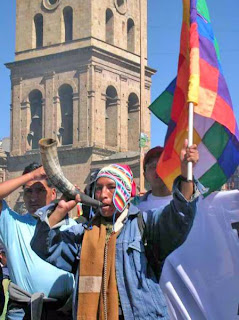Agencies in Cochabamba, July 5
Bolivia's president, Evo Morales, has warned he might close the US embassy in his country, as South America's leftist leaders rallied to support him over the rerouting of his presidential plane.
Morales again blamed Washington for putting pressure on European countries to refuse to allow his plane to fly through their airspace on Tuesday, forcing it to land in Vienna, in what he called a violation of international law. He had been returning from a summit in Russia during which he had suggested he would be willing to consider a request from the NSA whistleblower Edward Snowden for asylum.
"Being united will defeat American imperialism. We met with the leaders of my party and they asked us for several measures and if necessary, we will close the embassy of the United States," Morales said. "We do not need the embassy of the United States."
Morales made his announcement on Thursday as the leaders of Venezuela, Ecuador, Argentina and Uruguay joined him in Cochabamba, Bolivia, for a special meeting to address the diplomatic row.
At the end of the summit a statement was issued demanding answers from France, Portugal, Italy and Spain. The United States was not mentioned in the statement.
"Europe broke all the rules of the game," Venezuelan president Nicolas Maduro said shortly after arriving at Cochabamba airport. "We're here to tell president Evo Morales that he can count on us. Whoever picks a fight with Bolivia, picks a fight with Venezuela."
Maduro said an unnamed European government minister had told Venezuela the CIA was behind the incident.
"We are not colonies any more," Uruguay's president, Jose Mujica, said. "We deserve respect, and when one of our governments is insulted we feel the insult throughout Latin America."
Ecuador's president, Rafael Correa, said on Thursday he and other leaders were offering full support to Morales and called the rerouting of the plane an aggression against the Americas.
Cristina Fernandez of Argentina said Latin Americans treasured freedom after fighting for independence from Europe in the 19th century and then surviving Washington's 20th-century history of backing repressive regimes in the Americas. She demanded an apology for the plane ordeal.
"I'm asking those who violated the law in calm but serious manner, to take responsibility for the errors made, it's the least they can do," Fernandez said. "To apologise for once in their life, to say they're sorry for what they've done."
Morales has said that while the plane was parked in Vienna, the Spanish ambassador to Austria arrived with two embassy personnel and they asked to search the plane. He said he denied them permission.
"Who takes the decision to attack the president of a South American nation?" Maduro asked. Spanish prime minister Mariano "Rajoy has been abusive by trying to search Morales' plane in Spain. He has no right to breach international law."
Before the meeting, Morales said his ordeal was part of a US plot to intimidate him and other Latin American leaders.
He urged European nations to "free themselves" from the United States. "The United States is using its agent [Snowden] and the president [of Bolivia] to intimidate the whole region," he said.
France sent an apology to the Bolivian government. But Morales said "apologies are not enough because the stance is that international treaties must be respected".
Spain's foreign affairs minister, Jose Manuel Garcia-Margallo, said his country did not bar Morales from landing in its territory.
Amid the tensions, the US embassy in La Paz cancelled Independence Day celebrations scheduled for Thursday. In the eastern city of Santa Cruz, Bolivian government sympathisers painted protest slogans on the doors of the American consulate.
Bolivia has said it will summon the French and Italian ambassadors and the Portuguese consul to demand explanations.
Morales said he never saw Snowden when he was in Russia, and that Bolivia had not received a formal request for asylum for him. Despite the complaints, there were no signs that Latin America leaders were moving to bring Snowden to the region that had been seen as the most likely to grant him asylum.
Not all the region's leaders were not expected at the summit.
Brazil was represented by Marco Aurelio Garcia, President Dilma Rousseff's top international adviser. The presidents of Colombia, Chile and Peru, who have strong ties to the US, were not attending.
Colombia's president, Juan Manuel Santos, said earlier on Thursday he supported Morales, but asked other leaders to remain cool and avoid an escalating dispute between Latin America and the European Union.
"We're in solidarity with Evo Morales because what they did to him is unheard-of, but let's not let this turn into a diplomatic crisis for Latin America and the EU," Santos tweeted on Thursday.




No comments:
Post a Comment